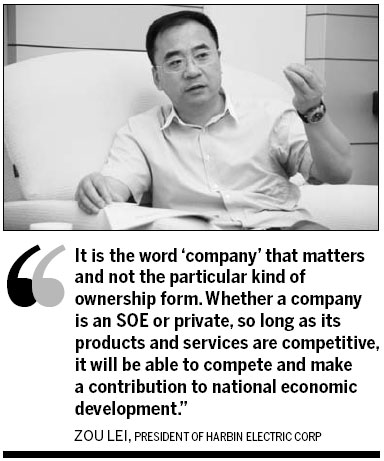It's about performance, not ownership structure
Zou Lei believes State-owned enterprises will continue to play a key role in China's economic development.
The president of Harbin Electric Corp, one of China's largest domestic power generation equipment manufacturers, says that in the current SOE-reform debate there is a danger of becoming too obsessed with ownership structures.

"It is the word 'company' that matters and not the particular kind of ownership form. Whether a company is an SOE or private, so long as its products and services are competitive, it will be able to compete and make a contribution to national economic development," he says.
Zou, who at 46 is one of the youngest leaders of a major SOE in China, was speaking in his office in Harbin's Sandadongli Road. He worries the achievements of SOEs since reform and opening up risk being undervalued amid the current calls by some for wholesale privatization.
"They have played an important role in China's progress and will continue to play an essential and indispensable role. The debate should not all be about privatization," he says.
HEC, which has 27,000 employees and had sales last year of around 30 billion yuan ($4.9 billion), is one of the 118 SOEs directly under the central government control of the State-owned Assets Supervision and Administration Commission of the State Council.
Zou says the company, which listed on the Hong Kong stock exchange in 1994, has always embraced reform.
"HEC is a typical example of SOEs that have made tremendous achievements during the past 30 years by making continuous reforms," he says.
"We have brought on board European institutional investors as well as individual investors and the ownership structure has already been diversified. I think we are a very vivid example of an SOE that can develop and adapt to modern market circumstances and conditions," he says.
Zou, an engaging and urbane personality, sees no need to alter the company's status as an SOE, particularly since it is engaged in a strategic sector.

























